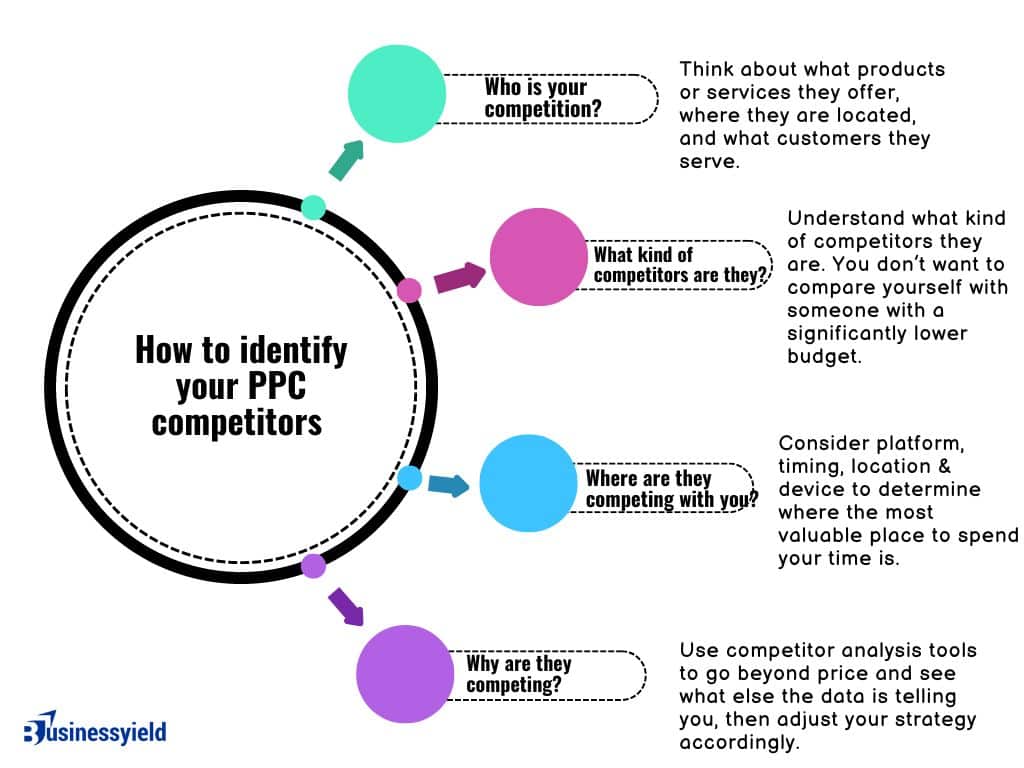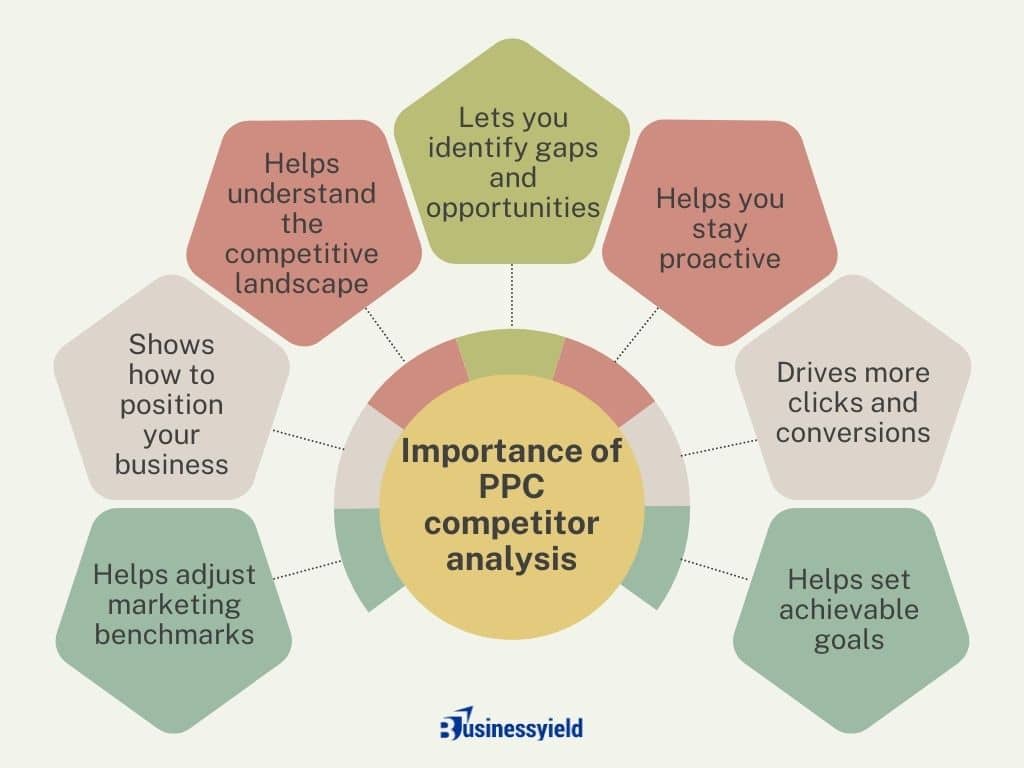No business operates in a bubble. If you’re a small business owner, chances are you think about your competition a lot. Even big businesses monitor their competition. But what should you focus on, and what should you do with that information? That’s where a PPC competitor analysis can help.
A thorough PPC competitor analysis helps you create strategies and allow you to refine your campaigns for better performance. In the competitive realm of digital advertising, understanding your PPC competitors is crucial.
However, you cannot do that without understanding what a competitor analysis is in the first place.
Key Points
- Competitor analysis is the process of identifying competitors in your industry and researching their different marketing strategies.
- A PPC competitor analysis assesses and contrasts your search engine marketing (SEM) approaches against your rivals.
- It offers an incredibly effective way to optimize and plan your paid search campaigns to promote your blog.
- By analyzing these components (and more), you can glean valuable insights into your competitive landscape.
What is a competitor analysis?
A competitor analysis, also referred to as a competitive analysis, is the process of identifying competitors in your industry and researching their different marketing strategies. You can use this information as a point of comparison to identify your company’s strengths and weaknesses relative to each competitor.
You can do a competitor analysis at a high level, or you can dive into one specific aspect of your competitors’ businesses. More often than not, small business owners find themselves juggling many tasks at once. Even amid a busy schedule, though, it’s worth taking the time to do a competitor analysis.
Understanding PPC competitor analysis
PPC competitor analysis is a systematic process where you critically assess and contrast your search engine marketing (SEM) approaches against your rivals. It aims to pinpoint where competitors are excelling, where they’re falling short, and most importantly, to unearth potential opportunities for differentiation and growth.
SEE: COMPETITOR ANALYSIS: What’s a Competitor Analysis & How Do You Conduct One?
This involves a deep dive into:
- Ad content, examining how competitors frame their messaging, their choice of words, and the kind of CTAs they use.
- Keyword strategy, investigating which keywords competitors are banking on and how effectively those keywords are driving results.
- Budget allocation, identifying how competitors allocate their ad spend, which campaigns they‘re investing heavily in, and which ones they aren’t.
By analyzing these components (and more), you can glean valuable insights into your competitive landscape’s strengths, weaknesses, opportunities, and threats. This not only informs smarter strategy but fosters innovation in PPC marketing campaigns.
Elements of a PPC competitor analysis
A PPC competitor analysis is not just a report — it‘s a comprehensive breakdown of your competitors’ advertising strategies on search platforms. Think of it as a magnifying glass that reveals the intricacies of their campaigns, providing you with invaluable data to inform your next steps.
Let’s peel back the layers to understand the core components of this analysis.
Ad content overview
Behind every successful PPC campaign lies compelling ad content that resonates with the target audience. This section zeroes in on the actual text and visuals your competitors use in their advertisements. By analyzing their ad copy, headlines, and CTAs, you can gauge the messaging that might resonate with the audience.
What’s their value proposition? Are they leveraging emotions, highlighting discounts, or emphasizing fast delivery? Understanding these elements can inspire your ad creation.
READ: Top 5 best services for paying for Facebook Ads, Google Ads, TikTok Ads, Microsoft Ads
Keyword strategy
The lifeblood of any PPC campaign lies in its keywords. Here, the analysis uncovers the specific keywords your competitors are bidding on. But it goes beyond just listing them. This section also showcases performance metrics associated with each keyword — like click-through rates, conversion rates, and quality scores.
Such insights can aid in refining your keyword strategy, ensuring you’re bidding on terms that promise optimal engagement and conversions.
Landing page experience
Once a user clicks on an ad, where do they land?
The destination — the landing page — is pivotal in converting that click into a desired action. This is your target audience’s fated first meeting with your brand. As Competitive Insight says: “Your brand strategy should align with your marketing efforts to ensure consistency in messaging, visuals, and customer experience. A well-crafted brand strategy fosters brand loyalty and recognition.”
This analysis segment evaluates competitors‘ landing pages’ design, layout, and user experience. It’s about aesthetics, ease of navigation, mobile optimization, and clarity of CTAs.
The efficiency of these pages in guiding users toward a conversion can offer a wealth of ideas to enhance your landing page designs.
SEE: Building Irresistible Landing Pages That Drive Results: From Click to Conversion
How to conduct a PPC competitor analysis
Competitive PPC analysis offers an incredibly effective way to optimize and plan your paid search campaigns to promote your blog, but how do you conduct this analysis?
Ultimately, it boils down to a few simple steps, all of which are outlined in the checklist below.
Conducting a PPC competitor analysis
How to identify your PPC competitors
This is arguably the most important step in your PPC competitor research. Without knowing how to identify your competitors, how do you know where to start? Some important questions to ask yourself:
- Who is going after the same keywords as you?
- Who is ranking in the top position and taking clicks away from you?
You need to find out the answer to both of these questions–without searching for the keywords that they’re targeting to generate more online traffic. After all, you don’t want to be fueling your competition!
This is when you use a PPC competitor analysis tool (more on those later) to gain insights into your client’s biggest threats.
SEE: CUSTOMER INSIGHTS: Definition, Marketing, Analyst, Tools & Salary
Here are some questions to consider when it comes to your competitors:

Who is your competition?
In order to determine who your competitors are, you need to dive into their specific business details. Think about what products or services they offer, where they are located, and what customers they serve. Also, keep in mind that your offline competitors may be completely different than your online competitors.
Use Google Ads to uncover metrics such as impression share, top-of-page rate, outranking share, and more. By looking into these metrics, create a plan of action on areas you need to improve.
What kind of competitors are they?
It’s crucial to understand what kind of competitors they are as well. You don’t want to compare yourself with someone with a significantly lower budget.
These are some of the common types of PPC competitors:
- Direct competition: Those who are offering the same product or service as you
- Indirect competition: A product or service that solves a particular need, but in a different way.
- Affiliates & Marketing Partners: Those who are promoting your brand or the competition’s brand, usually for a commission fee.
- Comparison Shopping Engines: An online platform that aggregates multiple products into one place for easy price and feature comparisons.
- Search arbitrages: Those who bid on a keyword only to bring users to another search platform to drive more traffic.
- Resellers: Other brands who may be selling your product or reselling your service.
Keep an eye on top branded PPC keyword trends or run a direct channel activity comparison between you and your competitor’s domain to gain more insights.
Where are they competing with you?
It would be impossible to keep track of every place each competitor is advertising on the internet. When doing your competitor analysis, consider the following when determining where the most valuable place to spend your time is.
Platforms:
- Are their ads primarily on Google Ads or Facebook Ads?
- Do they have retargeting campaigns?
Location:
- Are they competing locally, nationally, or internationally?
Timing:
- Do they turn their ads off during the weekends?
- Are their ads running during specific promotions or holidays?
Devices:
Are they more heavily focused on mobile, desktop, or a mix of both?
Tip: Use labels within third-party or publishers’ bidding tools to oversee any changes in your best-performing keywords. Try setting up automated alerts that deliver bidding recommendations to your inbox.
Why are they competing?
Depending on the type of competitor in the PPC mix, the intention behind the keyword targeting could change. For example, the purest form of direct competition is attempting to do the same thing you do – drive more revenue.
However, an affiliate or search arbitrager may be competing with your ads in order to earn a small commission or click fee, which often means you can quickly bid them out of top placement. After all, their margins are typically much smaller than yours, so they often can afford to spend as much to acquire those clicks.
SEE: ENDLESS CLICKS: A Comprehensive Guide To Digital Recruitment Marketing
Others may be trying to divert traffic from one brand (e.g. Nike) to another (e.g. Adidas). Also, competitors may be bidding on your keywords as a defensive strategy just to price you out of the running.
However, it’s important to note that you might not get ahead of your competitors with bidding alone. Because they may have the same intentions as you, use the competitor analysis tools to go beyond price and see what else the data is telling you. Then you’ll be able to adjust your strategy accordingly.
This could include changing bids, or it may involve you drilling deeper into some of the other parts that inform the Google Ads algorithm, such as improving CTRs, reducing bounce rates, and more.
Common mistakes in PPC competitor analysis to avoid
When it comes to PPC competitor analysis, pitfalls are plentiful. The process can be complicated, but it can elevate your PPC campaigns to a whole new level when done right.
Here are some of the most common mistakes marketers make during the account management process and how you can sidestep them.
- Irregular analysis: Competitor landscapes are not static; they evolve continually. You’ll likely miss out on significant trends and changes if you conduct a PPC competitor analysis once and never revisit it. It’s vital to perform this analysis regularly to keep your PPC strategy current.
- Data overload: Data is power, no doubt. However, an overabundance of data without clear action points can lead to analysis paralysis. It’s easy to get lost in the sea of information available. Stay focused on what truly matters for your PPC account – actionable data that aligns with your business goals.
- Copying competitors: While learning from your competitors is wise, copying them mindlessly isn’t. Just because a particular ad copy, keyword, or strategy works for them doesn’t mean it will work for you. Your competitive analysis should inspire your unique strategies, not clone your competitors’.
- Over-reliance on data: Although data plays a crucial role in shaping your PPC strategies, it’s not everything. Sometimes, you need to listen to your gut, particularly when it comes to understanding your target audience’s desires and concerns. Remember, data can guide you but can’t replace human insights and creativity.
- Ignoring small players: While analyzing top competitors is essential, don’t ignore the smaller or newer players in the market. These companies might be employing innovative tactics that could disrupt the industry. Keep an eye on them.
SEE: COMPETITOR ANALYSIS TOOL: Top 11+ Competitor Analysis Tools
Importance of PPC competitor analysis

Competitor analysis should be an integral part of your agency’s strategy. After all, if you want to help your clients get ahead of their competitors, you need to compare strengths and weaknesses and determine their point of difference in the market.
Competitor analysis is important because it:
- Shows what keywords competitors are targeting and how much they are spending. Identifying gaps in your client’s PPC campaigns ultimately saves them money.
- Helps your agency adjust marketing benchmarks to recognize opportunities to enhance your client’s strategy.
- Reveals how to position your client’s business to keep their customers’ attention with things like new trends, changes, and ideas.
- Gives your clients a competitive advantage by understanding their competitor’s ad copy and creative strategy.
When it comes to spending your client’s budget on paid search ads or any other paid marketing efforts, you can’t afford to look into what their competitors are doing.
A well-conducted PPC competitor research is also essential to creating a successful paid search strategy as it helps you:
Understand the competitive landscape
You can’t just dive straight into Google Ads and start bidding without first knowing who you’re competing with and how your PPC performance measures up.
SEE: Google Ads Search Certification Study Guide
Identify gaps and opportunities
Analyze what your competitors are doing to identify any glaring gaps in your own PPC campaigns. These could be untapped keywords, new and innovative ad copy or effective CTAs that are resulting in a lot of traffic for your competitors.
Stay proactive
Spot any new moves by competitors and shifts in your audience’s behavior as quickly as possible, so you can adapt your strategies and stay competitive.
Drive more clicks and conversions
Understand what drives the most engagement within your target audience by examining your competitors’ best-performing ads and landing pages.
Set achievable goals
With an overview of your competitors’ PPC performance, you can more accurately gauge what is achievable within your industry and set manageable goals for future success.
PPC competitor analysis tools
Competitor analysis tools help your agency track, analyze and learn from their competitors’ strategies. There are lots of tools out there, and knowing which one will work best for your client’s audience can be tricky. That’s why I’ve narrowed down our top choices that save you time while identifying valuable PPC data you might otherwise miss.
Use this information to boost your current marketing strategies to help them win big.
Semrush
Semrush helps you plan, analyze, and improve your client’s Google Ads campaigns. It includes features such as advertising and PLA research, PPC keywords tools, position tracking, and social media ad campaign tools.
All you need to do is enter a website and it will reveal information about your client’s biggest competitors, including top keywords and more.
Semrush also gives you insight into how much competitors are spending, although the accuracy can be debatable. At the end of the day, it’s a useful tool for clients who are advertising on multiple platforms.
Google Ads Auction Insights
This tool can only be used effectively when you’re running a live campaign for your clients. However, Google Ads Auction Insights can still provide you with actionable insights as long as you keep an eye on the Auction Insights tab regularly.
Basically, it lets you compare your client’s performance with other advertisers who are participating in the same auctions that you are.
SpyFu
This PPC competitor analysis tool gives you insights into the keywords, bidding, and ad strategies (within Google Ads) that your client’s competitors are using. It also allows you to see every keyword they’re purchasing and every ad they’re running.
SpyFu lets you get a deeper understanding of the competitors’ ad strategies which can inform you how to optimize your clients.
Ahrefs
Ahrefs is a great “all-in-one” platform that gives access to tools for link building, keyword research, competitor analysis, rank tracking, and site audits. Their keyword explorer tool helps you discover countless keyword options while analyzing their competitiveness. You can also calculate traffic potential and other key metrics such as global search volume, location-specific search volume, and average clicks.
Ahrefs is ideal for optimizing Google Ads campaigns and gives valuable insights on weak and low-potential keywords so you don’t waste your client’s budget.
READ: Copy These Campaigns! 7 Marketing Plan Examples That Crushed Their Goals
Facebook Ad Library
Keeping track of social media PPC mentions is important, too. Use tools such as Facebook Ads Library (AKA Meta Ads Library) to search for ads across Meta Products–currently active or not. Find out who created the ad, what it looks like, and when it ran.
Make your client’s ads more effective by studying competitors’ ads that are performing well.






